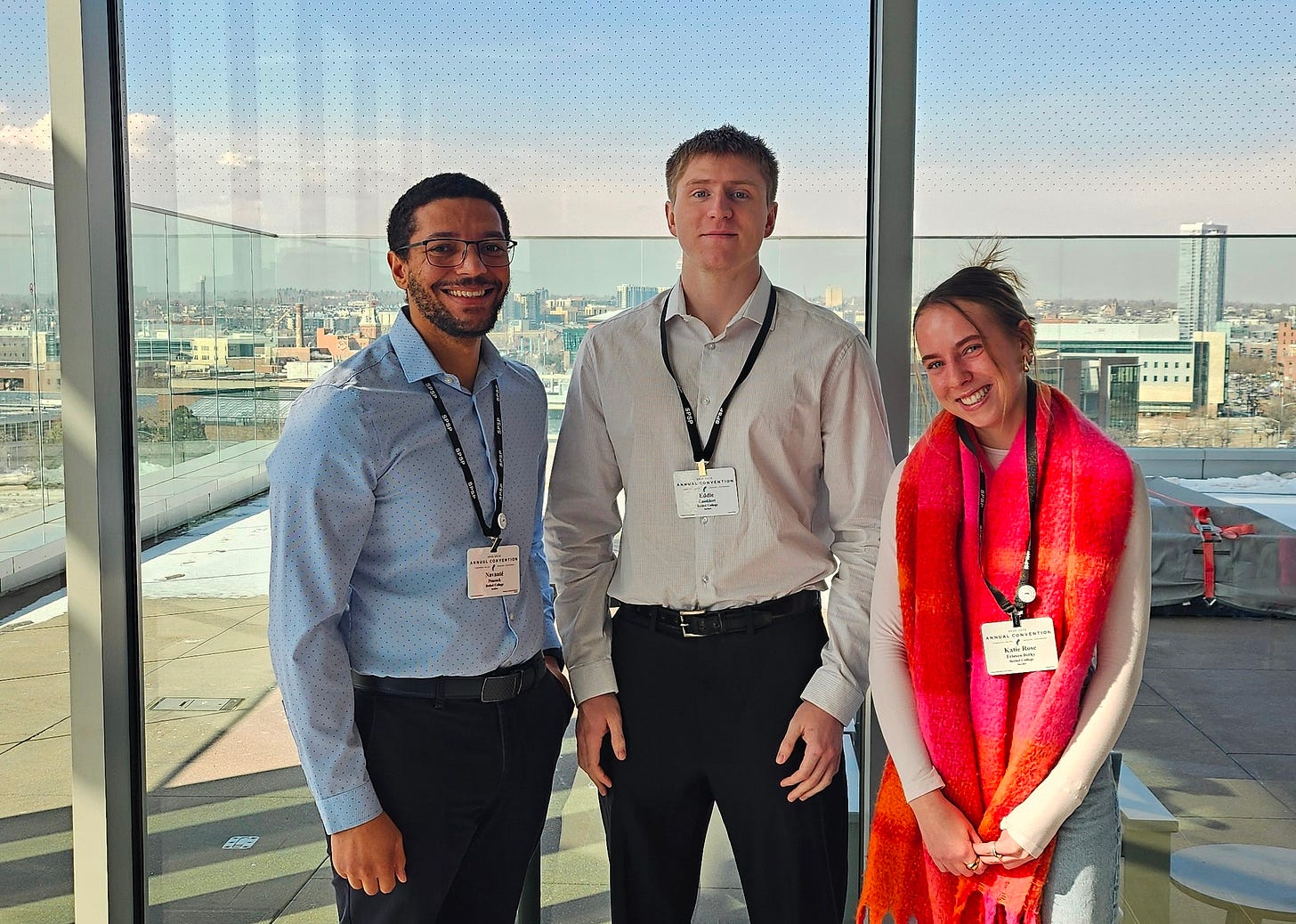Undergraduate research: Members of the Bethel College Psychology Department attend the Society for Personality and Social Psychology Conference
Dr. Navanté Peacock, Eddie Gaeddert, and Katie Rose Friesen Birky reflect on their research and recent experience at the Society for Personality and Social Psychology (SPSP).
Presenting research at any level is a unique opportunity, but it is especially impressive when undergraduate students are able to share their findings at an international conference. Two of Bethel College’s own students had this opportunity at the annual Society for Personality and Social Psychology (SPSP) Conference that recently took place in Denver.
The SPSP Conference is the largest gathering for social and personality psychologists. Eddie Gaeddert, a senior from Goessel, Kan., and Katie Rose Friesen Birky, a senior from Denver, both attended and were accepted to present posters over their senior research at the conference. Assistant Professor of Psychology, Dr. Navanté Peacock also attended the conference and presented a poster over his own research at the conference.

“My research examines how brain activity, specifically alpha asymmetry, along with positive and negative affect and perceived fulfillment differ in an online interaction compared to a face-to-face interaction,” explained Friesen Birky.
Using an electroencephalogram (EEG), she found data that suggests that the type of interaction, whether face-to-face or virtual, as well as the order in which they were completed, did not impact alpha asymmetry, positive and negative affect, or perceived fulfillment differently.
“I will also say that these were all preliminary results and data,” she added. “I'm still collecting data, so results could also change because none of my findings right now are significant due to my small sample size.”
Gaeddert’s research focused on artificial intelligence. “My research was looking at whether or not people can distinguish between AI-generated human faces and original photos of human faces,” he explained. “We are interested in looking at overall detection accuracy in participants.”
Despite familiarity with AI, Gaeddert found that participants’ scores showed that they were merely guessing and could not reliably distinguish real from AI-generated faces.
When deciding on a research focus, Friesen Birky emphasized the importance of social connections and relationships. “With the recent surge in social media and technology usage, I've noticed for myself that connecting with others online is different from connecting in a face-to-face setting,” she said. “I wanted to dive deeper into understanding how face-to-face interactions differ from virtual interactions.”
She expanded on this idea by stating, “We all know that forming connections with others is an innate human need, and it's fundamental to who we are. Not being able to form connections in relationships can be super damaging to your physical and mental health.”
Meanwhile, Gaeddert shared that the rapid development of AI is what sparked his research interests. “It's such a fast-moving, developing sector that research done a year ago is already irrelevant because new models are always coming out,” he explained.
He elaborated on his concerns, saying, “I chose my topic specifically because I was thinking about how AI could be used for misinformation or fake news. I'm really worried about that. I wanted to see how well the average person could actually distinguish AI-generated images—and they couldn't.”
Presenting at the conference was both an exciting and nerve-racking experience for Gaeddert and Friesen Birky.
“I was approached by a lot of people who were super interested in what I was doing,” said Gaeddert. “These people had seen my project and marked it as something they wanted to check out, which just shows how interested they were in my work. As an undergraduate, that doesn’t happen a lot.”
Friesen Birky shared a similar sentiment. “I realized very quickly when presenting my poster that it was easier and more fun to talk about research when you're passionate about the project you're working on, and when you've put so much time and effort into it.”
She added, “It's just fun to be surrounded by people who are passionate and curious about similar things. It was nice to have psychology-related and centered conversations.”
After graduation, Gaeddert plans to attend the University of Kansas School Psychology Education Specialist program, while Friesen Birky hopes to work in a psychology lab so that she can refine her research skills and eventually apply to a social psychology Ph.D. program.
Reflecting on the conference, Peacock emphasized the importance of continuing research in social psychology. “There's a lot of need for us to continue doing the work that we are doing in the current climate, as that is the exact type of work that some are trying to suppress,” he stated. “It's up to us to make sure that people are learning the realities of life through empirically backed research at a time when it is needed the most.”
“There's a lot of need for us to continue doing the work that we are doing in the current climate, as that is the exact type of work that some are trying to suppress,” he stated. “It's up to us to make sure that people are learning the realities of life through empirically backed research at a time when it is needed the most.”
Dr. Navanté Peacock
Peacock also highlighted the dedication of Friesen Birky and Gaeddert. “I got feedback that Katie Rose and Eddie both provided excellent presentations and that people are routinely surprised that a small college like us can produce high-level researchers,” he said. “I think it's a testament to what we have to offer here at Bethel.”

